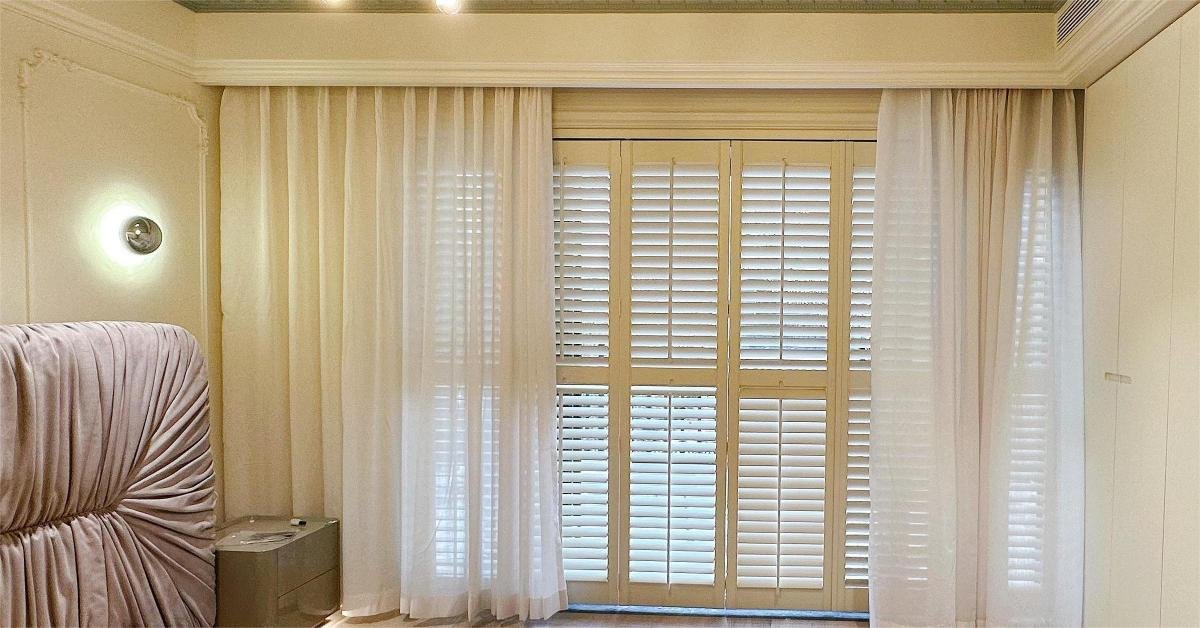
If you’re looking for a stylish and practical solution for your sliding doors, plantation shutters may be what you need. These versatile window treatments offer a range of benefits, from light control to privacy, and can add a touch of elegance to any room. In this ultimate guide, we’ll explore everything you need to know about plantation shutters for sliding doors.
What Are Plantation Shutters?
Plantation shutters are a type of window treatment consisting of a frame and a series of horizontal louvers or slats that can be adjusted to control the amount of light and air that enters a room. They are typically made of wood, vinyl, composite wood, or faux wood and can be installed on the interior or exterior of a window.
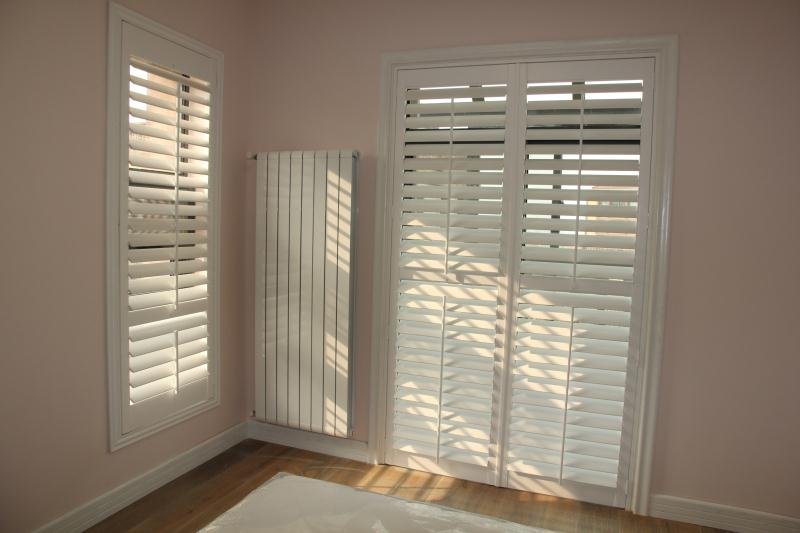
The name “plantation shutters” comes from their historical use in the plantation homes of the American South, where they were famous for keeping homes cool in the hot and humid climate while still allowing for natural light and ventilation. Today, plantation shutters are a popular and versatile window treatment option that can add style and functionality to any home or room.
Benefits of Plantation Shutters for Sliding Doors
Plantation shutters can offer several benefits for sliding doors, including:
- Light Control: Plantation shutters allow you to adjust the amount of light that enters your room, making them an excellent choice for sliding doors that get a lot of natural light.
- Privacy: Because plantation shutters have louvers that can be adjusted, they offer a great deal of privacy when closed, which can be especially important for sliding doors that face a busy street or neighbor’s property.
- Insulation: Plantation shutters can help insulate your home and provide an additional barrier against heat or cold, making them a good choice for sliding doors that let in a lot of outside air.
- Durability: Plantation shutters are typically made from high-quality materials like wood or vinyl, which can withstand the wear and tear of regular use and last for many years with proper care.
- Style: Plantation shutters are a classic and elegant window treatment option that can add style and sophistication to any room. They come in various colors, finishes, and materials, so you can choose the perfect choice to match your decor and personal style.
Overall, plantation shutters can be an excellent choice for sliding doors, offering practical benefits and aesthetic appeal.
Types of Plantation Shutters for Sliding Doors
Several types of plantation shutters can be used for sliding doors, including:
- Bypass Shutters: These shutters slide on a track and bypass each other to open and close, similar to sliding closet doors. Bypass shutters are an excellent option for wider sliding doors, as they can cover larger areas without obstructing the doorway.
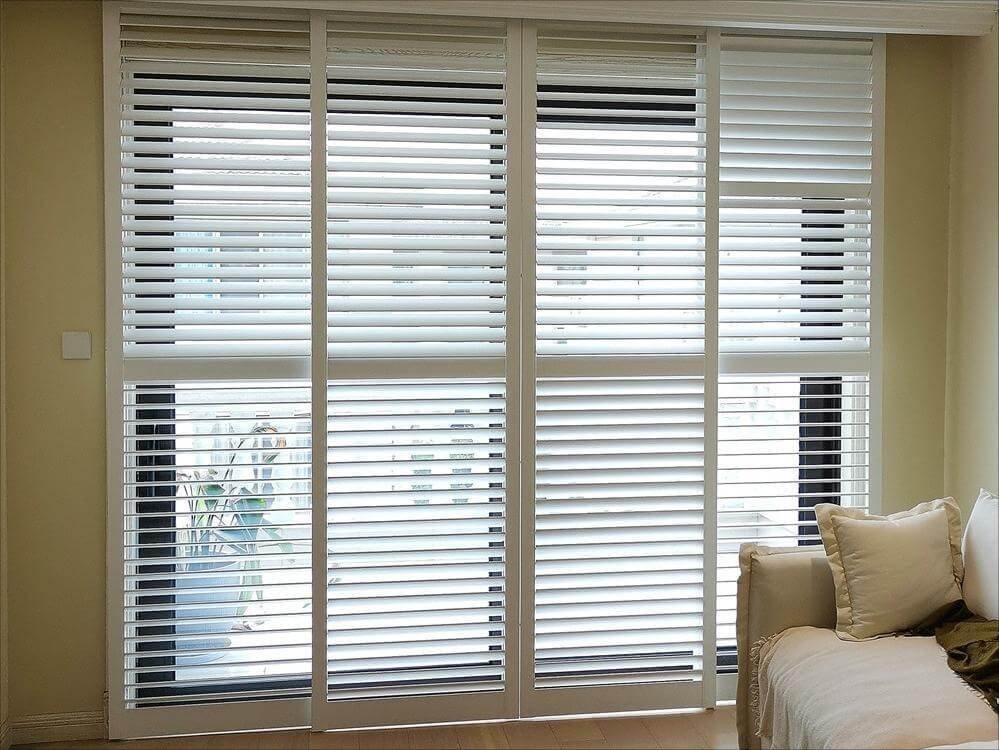
- Bi-Fold Shutters: Bi-fold shutters fold in the middle and stack on either side of the door, similar to bi-fold closet doors. They are a good choice for sliding doors that are not very wide.
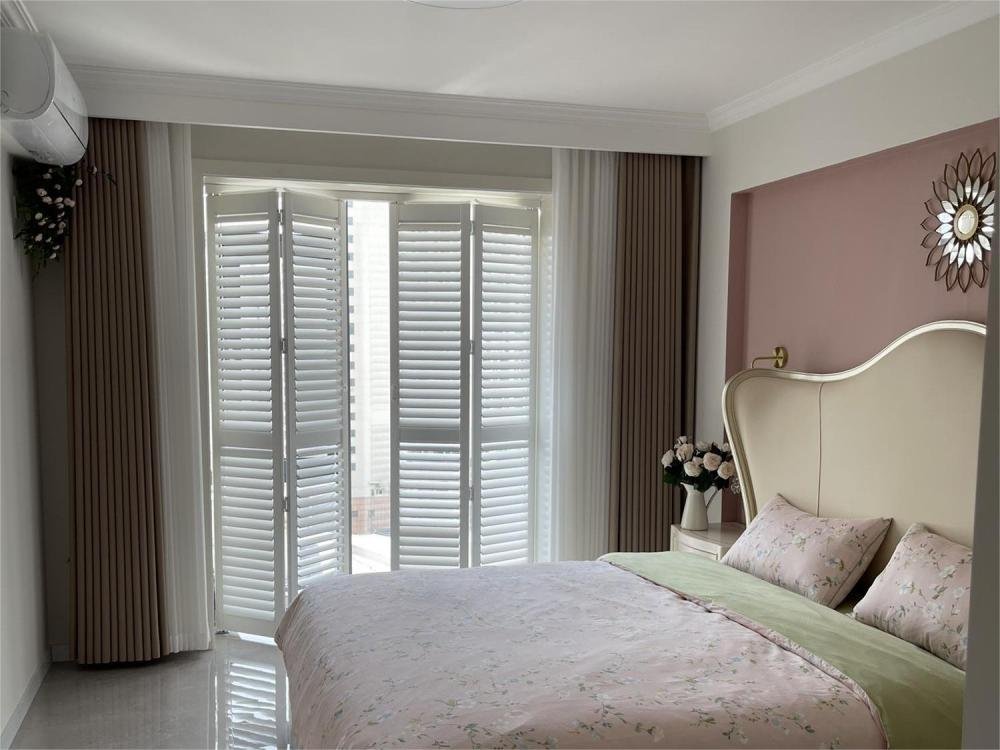
- Double-Hinged Shutters: Double-hinged shutters are hinged on both sides and can be opened from the center, similar to French doors. They are an excellent option for narrow sliding doors with much vertical space.
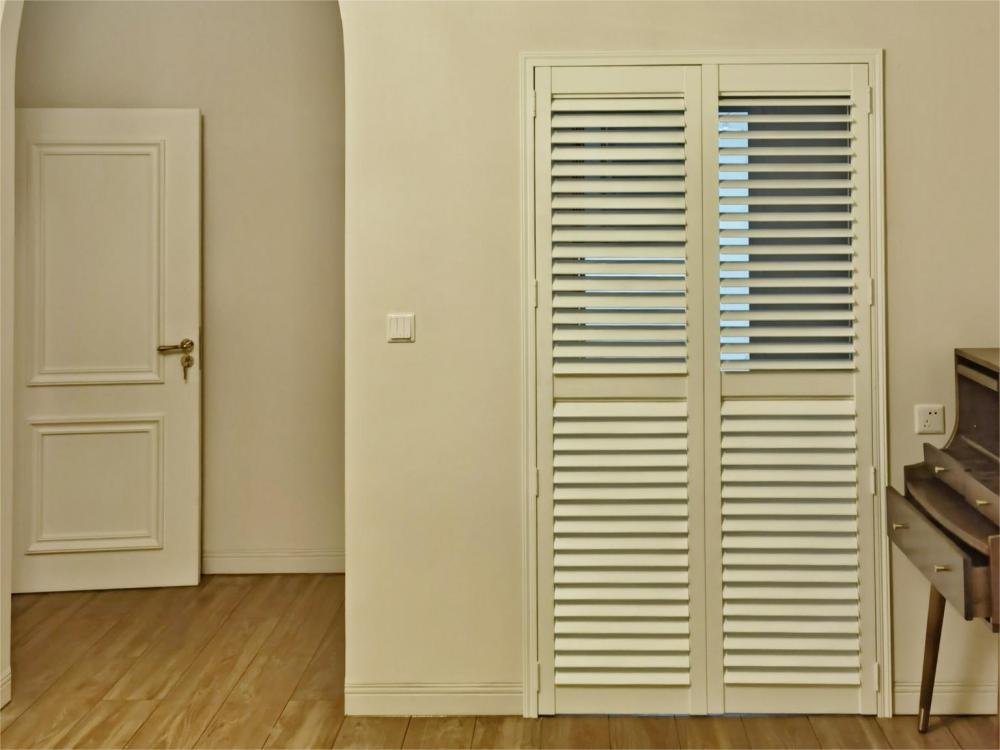
- Panel Track Shutters: Panel track shutters have large panels that slide on a track, similar to vertical blinds. They are an excellent option for sliding doors with limited space or rooms with modern or contemporary decor.
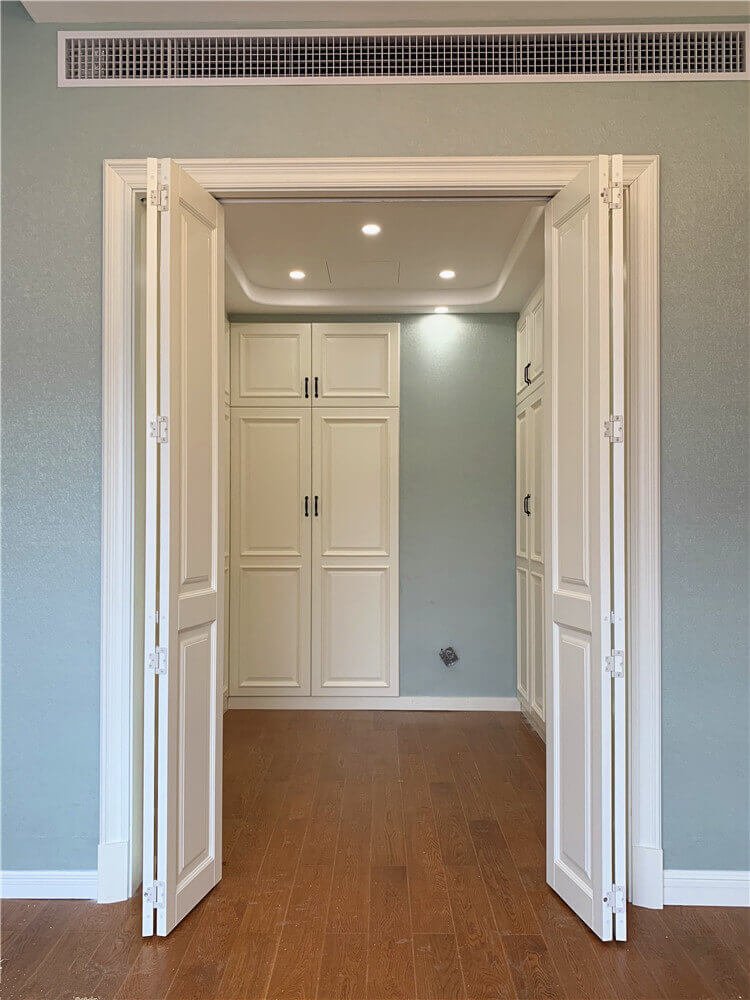
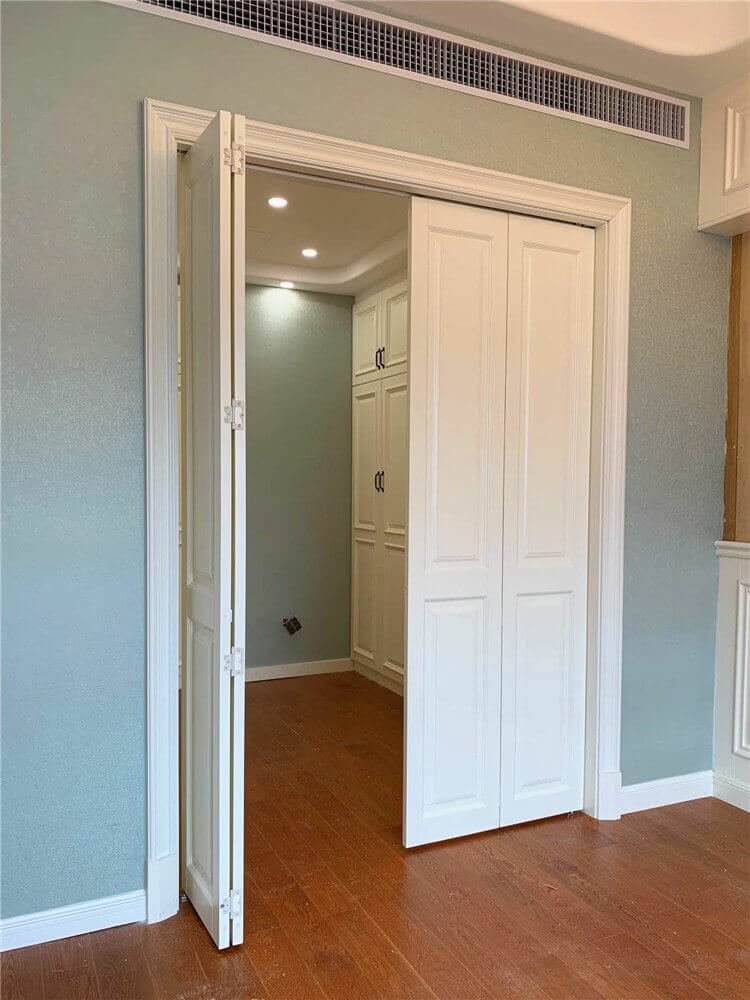
Overall, the type of plantation shutter best for your sliding door will depend on the door size, available space, and your personal style preferences.
Materials of Plantation Shutters for Sliding Doors
The materials commonly used for plantation shutters for sliding doors are:
Wood: Wooden shutters provide a classic and natural look to your sliding doors. They are durable and long-lasting with proper care. However, they are susceptible to warping or cracking in high-moisture environments.
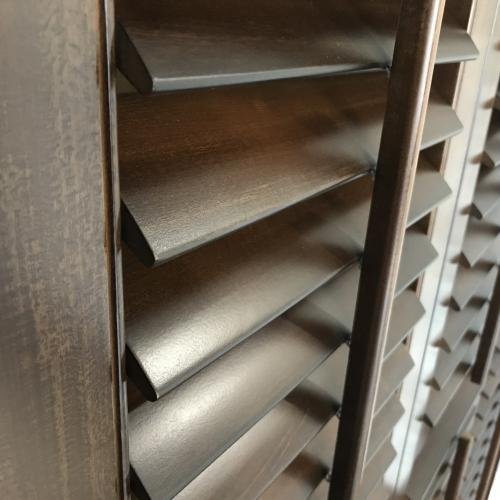
Benefits:
- Aesthetically pleasing and traditional look
- Durable and long-lasting
- Excellent insulation and noise reduction
- Can be painted or stained to match the decor
Drawbacks:
- More expensive than other materials
- Can warp or crack in high-moisture environments
Vinyl: Vinyl shutters are affordable and resistant to moisture and humidity, making them a good choice for high-moisture areas like bathrooms and kitchens. They are easy to clean and maintain. However, wood shutters may have a different natural look and feel.
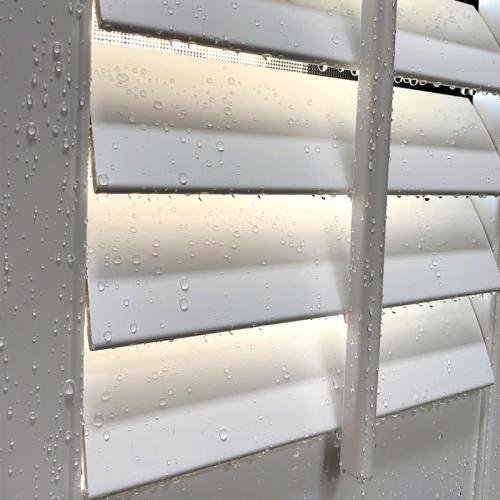
Benefits:
- Affordable and widely available
- Resistant to moisture, humidity, and UV rays
- Easy to clean and maintain
Drawbacks:
- Limited color options
- Not as durable as wood materials
- It may not have the same natural look and feel as wood
Composite wood: Composite wood shutters are made from a mixture of wood and synthetic materials, making them durable and resistant to warping, cracking, and fading. They are less expensive than natural wood shutters.
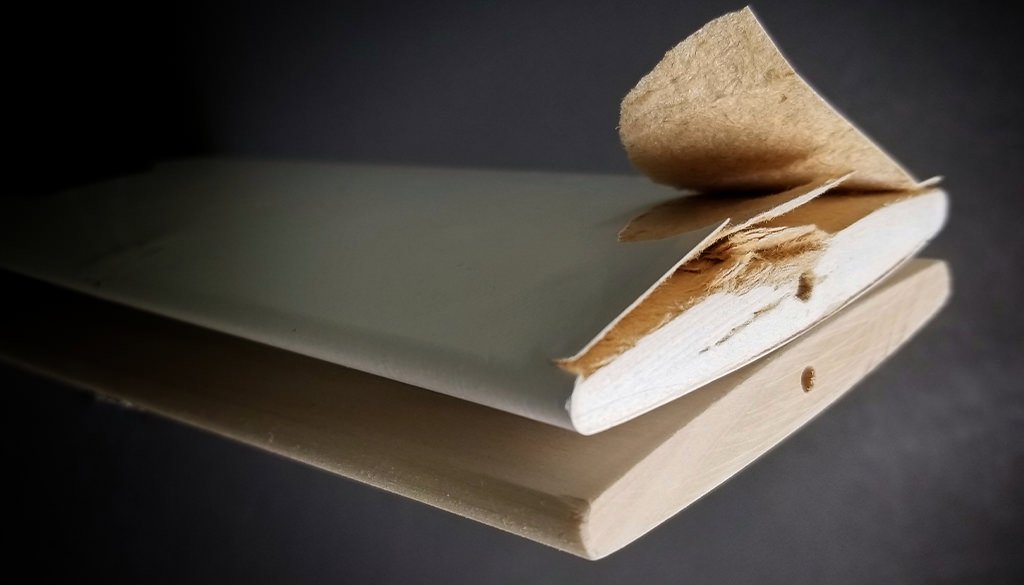
Image of a composite wood vs. natural wood
Benefits:
- Made from a mixture of wood and synthetic materials, making them durable
- Resistant to warping, cracking, and fading
- Less expensive than natural wood shutters
- Excellent insulation and noise reduction
Drawbacks:
- It may not have the same natural look and feel as wood shutters
- It can be heavier than other materials
Faux wood: Faux wood plantation shutters are typically made from a composite material that combines PVC and a wood or MDF core. The core is covered with a PVC or vinyl coating that looks like natural wood.
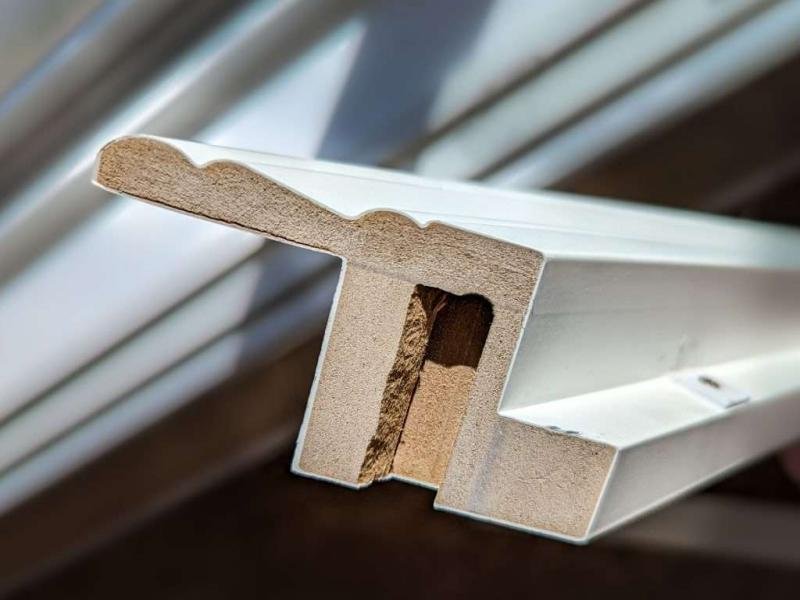
Faux wood shutters(with Wood or MDF core)
Benefits:
- Resistant to moisture and humidity
- Durable and easy to maintain
- Affordable and widely available
Drawbacks:
- It may not be as durable as other materials
- Limited color options
- Can be affected by extreme temperatures
Each material has unique benefits and drawbacks, so it’s essential to consider factors such as style preferences, budget, durability, and maintenance requirements when choosing the best material for your sliding door plantation shutters.
Installation & Maintenance Tips for Sliding Door Shutters
Here are some installation and maintenance tips for plantation shutters on sliding doors:
- Installation: Plantation shutters on sliding doors can be more complicated than regular windows due to the door’s size and weight. It is recommended to have a professional installer to ensure proper installation. The shutters should securely attach to the door frame to prevent any sagging or misalignment.
- Maintenance: Regular cleaning of plantation shutters on sliding doors is essential to maintain their appearance and functionality. Dust them frequently with a soft cloth or brush, and wipe them down with a damp cloth or sponge as needed. Avoid harsh cleaning agents, which can damage the shutters’ finish. Instead, a mild soap solution can be used for stubborn stains or dirt buildup. Additionally, inspect the hinges and tracks to ensure they are clean and debris-free.
- Lubrication: Over time, the hinges and tracks on plantation shutters for sliding doors may become stiff or difficult to move. It is recommended to periodically lubricate these areas with a silicone-based lubricant to keep them functioning smoothly.
- Adjustment: As the seasons change, the temperature and humidity can cause the shutters to expand or contract. This can result in misaligned or sticking shutters. If you notice this issue, adjust the hinges to ensure they are correctly aligned and operating smoothly.
Following these tips, you can ensure that your plantation shutters on sliding doors remain functional and beautiful for years.
